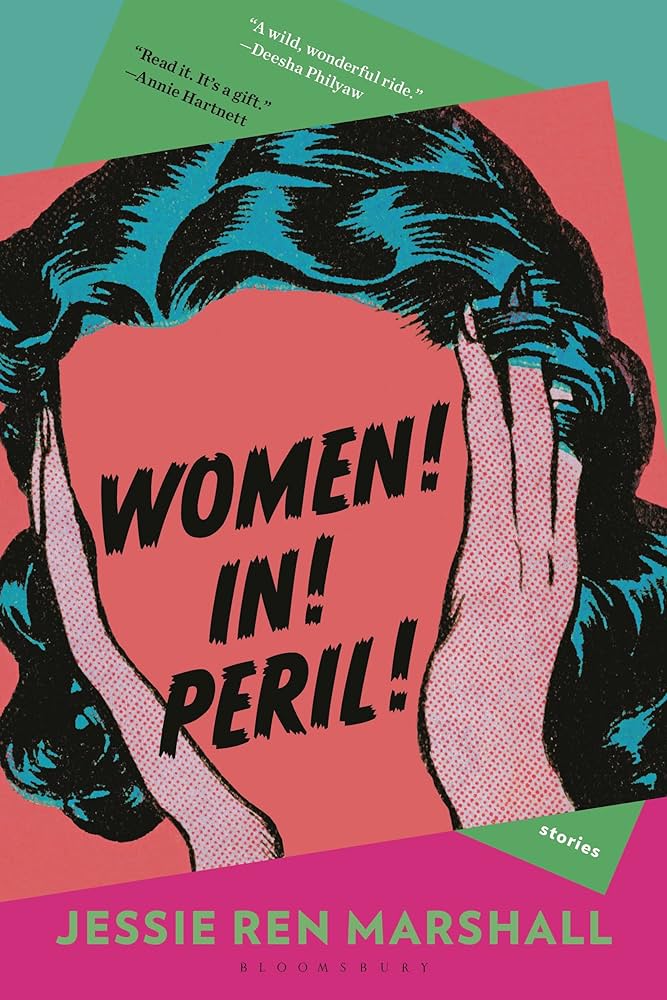Review of Women! In! Peril! by Jessie Ren Marshall

Women! In! Peril!
Jessie Ren Marshall
Bloomsbury, 2024, 288 pages
$17.99
Reviewed by Courtney Heidorn
There is something for every reader in Jessie Ren Marshall’s short stories: robot girlfriends, sapphic ballerinas, lesbian co-parents, and women flying through space. Marshall writes in several genres—romance, sci-fi, young adult, and more. Yet, the collection remains unified with exclusively female narrators and the truth that these women are, in fact, in peril. The most memorable perils to note are big tech controlling women’s bodies, divorced women grieving awful men, and pseudo-spiritual sapphic stories.
Stories like “Annie 2” and the titular story “Women! In! Peril!” display Marshall’s commentary on sexism, especially in the context of late-stage capitalism and rapid technological advancements. Annie is a female life-like robot who does housework and, when desired, is a sex toy. She says that robots like her are “not capable of wanting anything for [themselves], other than to be useful and used” (25). Annie is a robot, so this is in her design. However, Annie represents the pigeon-holed patriarchal roles assigned to women. With this in mind, Marshall cleverly gives Annie a bit of humanity—she cares for the other appliances and household items, like cleaning the toaster or shining shoes. Although her human owners control her, Marshall gives Annie agency within her captivity to care for other items destined to be thrown out and forgotten.
Marshall writes several stories that involve divorce, and almost all of them involve the female protagonists finding their way after their marriages end, as well as grappling with the reality that their previous male partners were, in fact, terrible. In “Dogs,” the narrator’s husband leaves her on a whim for one of his clients at his veterinary practice. The story consists of her in the early stages of grief—she can barely shower or leave the house. Marshall employs a dog motif throughout the story, and by the end, the reader realizes that she is likening the ex-husband to a dog. The speaker is going for a drive, and she sees a dog in the road and contemplates rescuing it, but it runs away. She says, “I could turn the car around, take the one I love and try to save him, but I know it wouldn’t work. The dog has made his choice” (99). Her ex-husband has made his choice, and she can do nothing. Marshall’s wit allows her to create metaphors that work well emotionally, but they also successfully take digs at awful men.
There are a few sapphic stories in this collection, and I can only describe them as spiritual—their themes go beyond what is tangible and knowable. In “My Immaculate Girlfriend,” the protagonist’s girlfriend gets pregnant, to both of their surprise, and the girlfriend believes it was God who impregnated her. The story ends with the protagonist’s acceptance of faith and doubles down on her love for her girlfriend: “I would never leave her. I would never let her go” (51). In “Late Girl,” we follow a dance student’s traumatic accident that leaves her with memory loss. However, her body remembers her dance choreography even when her mind is blank. It is revealed that her body remembers more than just dance moves; it also remembers her intimate relations with an unexpected character. When her mind catches up with her body, she does “the most honest thing a body can do. It gave her this mouth, this tummy, these thighs and cheeks and hands” (147). Marshall’s sapphic stories are dreamy, warm, and very well executed.
Each reader will see themselves in Marshall’s impressively nuanced, flawed characters. The diversity in storytelling and genre in Women! In! Peril! is genuinely impressive and very fun to witness. Picking up Women! In! Peril! is a great way to celebrate AAPI voices this month and always.
Courtney Heidorn (she/they) holds a BA in English and Creative Writing from Azusa Pacific University. You can see more of their work in their chapbook, Palimpsest, from Bottlecap Press and at CURIOUS Magazine and Pearl Press.
"Empowerment comes from ideas."
― Charlene Carruthers
"Your silence will not protect you."
— Tourmaline
"Gender is the poetry each of us makes out of the language we are taught."
— Leila Raven


